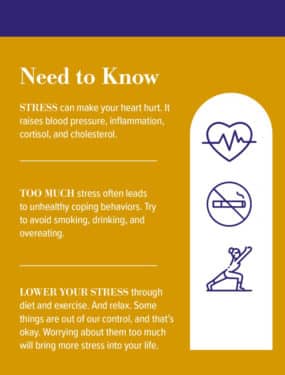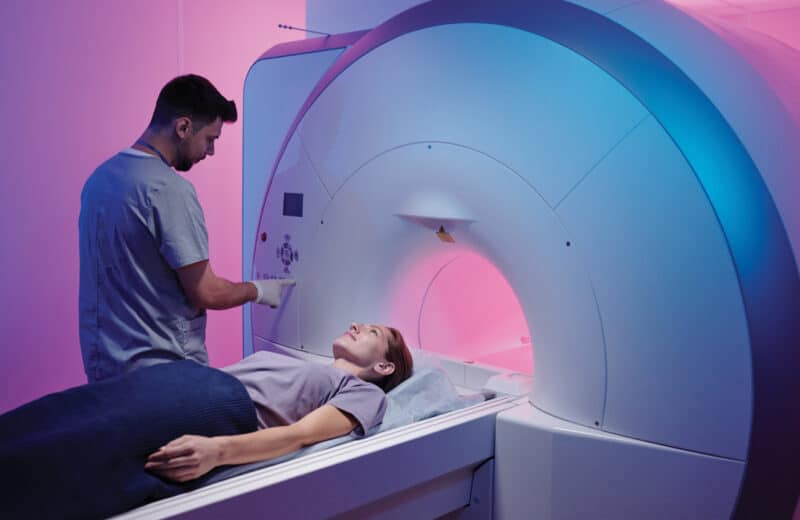The effects of stress on heart health
At 28, I got into an argument with my boyfriend and ended up collapsed in my apartment stairwell, clutching my chest. I wasn’t being dramatic. My heart was racing at about 200 beats per minute — two to three times faster than a standard heart rate. It was the latest in a string of stress-based episodes of supraventricular tachycardia (SVT) — an irregular heart rate condition that people often feel as palpitations. I’d had the condition since I was about 20.
Anything can trigger SVT’s excessively fast heartbeat (even jumping over a crack in the sidewalk), but the biggest culprit for me was stress. Getting into arguments, overworking myself, having to stand too long in a security line with a heavy bag — all of it could send me reeling.
While medications can help some control the fast rhythm, a cardiac ablation — a procedure that creates scar tissue in your heart to block irregular electrical impulses — resolved my tachycardia. But too much stress can still affect my heart health — and yours, too. If chronic stress plagues you, it could be negatively impacting your heart.
“Emotional stress can affect heart health in multiple ways,” says Philip Krause, MD, a cardiologist at NorthShore University HealthSystem.
Effects of stress on the heart include:
- High blood pressure, which in turn increases risk for heart attack, stroke, and may eventually lead to kidney disease.
- Inflammation of the arteries.
- Increase in cortisol levels, which can increase cholesterol — a risk factor for heart disease.
A temporarily broken heart
And did you know that broken heart syndrome is actually a real, stress-induced condition? It’s not just related to losing a loved one. Officially called stress-induced cardiomyopathy, the rare, temporary impairment can mimic heart attack symptoms and follow stressful situations, such as an injury, financial loss, or any extreme emotion.
“This syndrome [also] carries the name of takotsubo syndrome. The heart adopts a shape similar to that of a Japanese octopus trapping pot or takotsubo,” says Clyde Yancy, MD, chief of cardiology at Northwestern Medicine and associate director of the Bluhm Cardiovascular Institute.
Yancy says the syndrome affects mostly women (90%), and may result from an excess amount of adrenaline released in reaction to a traumatic event.
“The syndrome is usually short-lived,” Yancy says. “Once the evidence of stress resolves, and presumably, the surge in adrenaline subsides, the heart reverts to normal. The syndrome is rarely fatal. Nearly all patients experience recovery, but recent evidence does suggest a higher risk for future heart disease in those who experience broken heart syndrome.”
When stress triggers heart attack symptoms (chest pressure, squeezing, or heaviness; jaw or back pain; shortness of breath; sweating; and nausea) in someone who has a heart condition, Krause says to remember that “time is muscle” — meaning the quicker you get treated, the less heart muscle damage you’ll suffer.
Making amends
Not only does constant stress take a toll physically, it can also lead to unhealthy coping behaviors that make it even harder on your heart. Under stress, many turn to cigarettes, alcohol, or high fat foods, or avoid exercising. Stress is also a major factor in what Krause calls “medical non-compliance” — not taking your medication when you know you should or ignoring doctors’ orders.
The solution is obvious, but not necessarily easy: Lower your stress, and keep heart-healthy habits.
Switch to a low-fat, low-cholesterol diet, such as the Mediterranean diet. Stop smoking. Keep your blood pressure in check, eat less salt, and take any medications you’ve been prescribed. And do what you can to get in 30 minutes of exercise at least five days per week — walking, climbing stairs, dancing, or other continuous activity.
“People do not need to train for a marathon to reap the benefits of exercise,” Krause says. “Daily movement is the key. Seeking out enjoyable activities including sports, activities with family and friends, hobbies, and service to others are great ways to decompress.”

“For the unavoidable intermittent stressful situations, which lately seem plentiful, trying to deal with issues within our control directly when they arise is best,” Krause says. “It is important not to procrastinate and let stress build.” At the same time, he adds, “Don’t sweat the small stuff [or] those larger issues beyond our control.”
Sweating the small stuff was one of my major problems, leading to SVT. I’ve always been an anxious person, and that anxiety tipped over into my heart health.
Now, I’ve had an ablation and take medication for anxiety, so I’m able to stay cool-headed more often than not. But when stress and anxiety do rear up, I jump to immediate action: deep breathing, journaling, remembering what is and is not under my control. It’s helped me keep my stress in check and my heart healthy.













